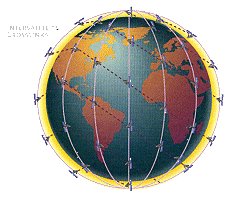There are 3 main choices in "global" satellite phones. Here is a quick summary.
(If you only need coverage in specific regions contact me and I'll fill you in on your other options.)
 |
| click to enlarge |
 • Globalstar (partial global coverage - low Earth orbit satellites)The map above shows expected coverage for all USA Globalstar satellite phone subscribers using the Globalstar GSP phone series. For customers using the Globalstar FAU-200 fixed satellite phone calls can be placed from US/Caribbean Home Service Area and Canada to any standard phone number in the world.
• Globalstar (partial global coverage - low Earth orbit satellites)The map above shows expected coverage for all USA Globalstar satellite phone subscribers using the Globalstar GSP phone series. For customers using the Globalstar FAU-200 fixed satellite phone calls can be placed from US/Caribbean Home Service Area and Canada to any standard phone number in the world.
Airtime minutes included in the Globalstar satellite phone service plans only apply to the United States and Caribbean Home Service Area. Roaming rates apply outside of the United States and Caribbean.
The Globalstar GSP-1700 satellite phone offers an ergonomic design that makes it comfortable for hand-held operation. The phone measures 225cc in total volume and weighs 200 grams (including battery). The height is 135 mm, the width is 55 mm and the thickness is 37 mm. The satellite antenna, when held in a vertical position, communicates with the Globalstar satellite at elevations more than 10 degrees above the horizon. The Globalstar antenna rotates and stows into the handset for convenience when not in use.
• Inmarsat (global - excepting polar regions - geosynchronous satellites)
 |
| click to enlarge |
Inmarsat IsatPhone Pro, LandPhone, and FleetPhone Coverage
The map depicts Inmarsat's expectations of coverage, but does not represent a guarantee of service. The availability of service at the edge of coverage fluctuates depending on various conditions.
"The new IsatPhone satellite cell phone provides voice and data over the I4 satellite network. This is the newest satellite phone on the market, now providing some competition with Iridium.
The IsatPhone Pro, using high quality satellite phone service from Inmarsat, currently provides coverage over the entire planet, except the polar regions, using Inmarsat's latest generation Inmarsat-4 satellite network. This phone is packed with features and compares very competitively with satellite cell phone offerings from Iridum.
The Isatphone Pro is an affordable satellite cell phone option for people who work, live, or travel to areas where communication may be non-existent or emergency back up communications is needed. The Isatphone Pro is one of the smallest satellite phones on the market today. It is easy to use, lightweight, and rugged. It even has a built-in GPS receiver. Your can text or email your position!"
• Iridium (fully global - low Earth orbit satellites)
This is the smallest of the Iridium handsets.
"Iridium provides complete coverage of all ocean areas, air routes and all landmasses - even the Poles. Iridium delivers essential services to users who need communications access to and from remote areas where no other form of communication is available. Select from our range of Iridium satellite phone rental or Iridium satellite phone purchase solutions, and we will deliver a ready-to-use handheld IRIDIUM Satellite Phone kit to you overnight anywhere across North America.
Standard Voice Services
The Iridium system provides true global voice services by covering areas that cellular and landline do not. Voice services are supported using the smaller, lighter, water resistant 9505 satellite phone. The excellent signal strength provided by the Iridium constellation supports reliable connectivity across wide ranging landscapes and situations.
The three Restricted Countries where the Iridium phone will not complete a call to the local phone system are: N. Korea, Poland, and Hungary.
The embargoed countries where a satellite phone will work in these countries (we cannot guarantee service), but there (may be) issues taking an Iridium phone into these areas at customs/border patrols: Cuba, Iran, Libya, Sudan, Angola & Yugoslavia. You may need special government permission to bring a satellite phone into embargoed countries.
The Iridium 9555 satellite phone is designed to withstand the toughest environments and will work from anywhere on the planet to anywhere. All that is required is a clear view of sky.
Users can choose from prepaid service plans or monthly service plans to complete the package. With Irdium there are no roaming and no long distance charges, just one simple rate."
I'll keep you posted on worthwhile advancements as they emerge. ~Kevin
Data courtesy of: http://www.globalcomsatphone.com
 At first thought to be a deliberate attack, the outbreak of mysterious
symptoms may be the result of shoddy espionage equipment, experts say...
At first thought to be a deliberate attack, the outbreak of mysterious
symptoms may be the result of shoddy espionage equipment, experts say...
















